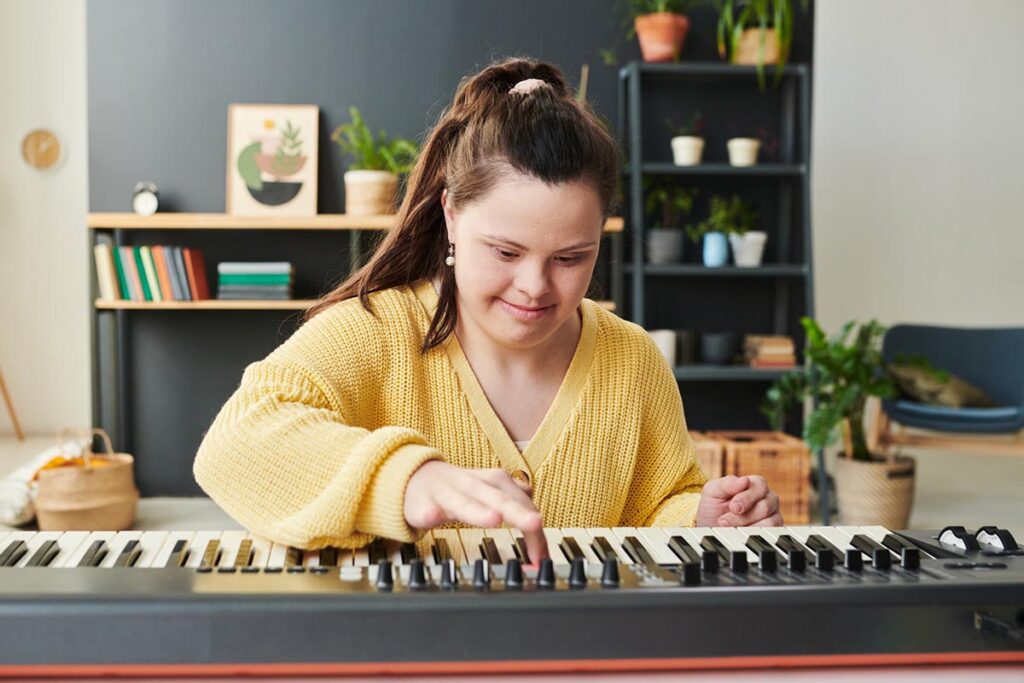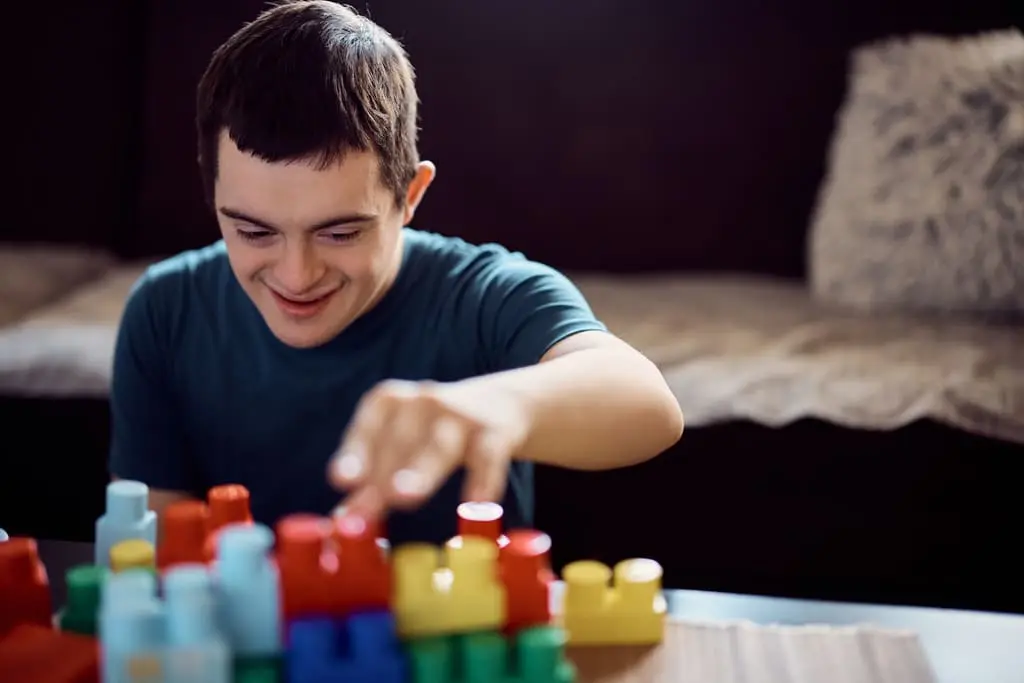The Link Between Down's Syndrome and Learning Disabilities
A person with Down’s Syndrome sometimes has some form of learning or intellectual disability. It can scale from being a mild to moderate learning disability, but learning and thinking problems are rarely severe, and many people with Down’s syndrome go on to pursue higher education.
Children with Down’s syndrome could take longer than other children of the same age to hit a particular milestone or develop a skill.
Learning Disabilities and Down's Syndrome
People with Down’s syndrome can experience learning difficulties and disabilities due to delays in various areas of development. However, not all areas are affected the same.
People with Down’s syndrome usually develop at a different rate than their peers. But, just because they don’t meet educational criteria and milestones at the same time as another child their age, it doesn’t mean that they won’t reach it at all. As with all pupils, children with Down’s syndrome have a huge range of abilities, such as:
- Social development
- Strong visual learning skills
- Strong word reading
- High capacity for empathy
Intellectual Challenges
Down’s syndrome is a genetic condition that occurs when a person has a full or partial copy of chromosome 21. This extra chromosome can cause physical and intellectual challenges and they can range from mild to moderate. Some of them include:

- Overestimating a situation
- Short attention span or ADHD
- Instinctive and spontaneous behaviour
- Learning at a different rate
- Delayed speech development
- Delayed language development
These intellectual challenges can then lead to behavioural challenges. But, an early development strategy and support can help. Also, the Down’s Syndrome Association can provide a lot of helpful resources.
Hearing and Vision Impairment
People born with Down’s syndrome have anatomical differences which is why they are more prone to ear infections. Fluid tends to build up in the middle ear; if it remains untreated, the child can develop ear wax, leading to an ear infection. Fortunately, this can easily be treated.
Vision is another area to take into consideration for people with Down’s syndrome, mainly because of the genetic condition and physiological features of the eye. Some of these problems can be easily resolved with prescription glasses.
Two of the most common vision problems for people with Down’s syndrome include:
- Far sightedness
- Near sightedness
Two of the less common vision problems for people with Down’s syndrome include:
- Strabismus
- Congenital cataracts
Behavioural and Emotional Challenges
Behaviour challenges are common for all children. But when evaluating behaviour in a child with Down’s syndrome, it’s vital to know the source of such behaviour.
Some of the most common behavioural challenges include:
- Temper tantrums
- Wandering off
- Stronger reactions to certain situations
- Impulsiveness
- Refusal to follow instructions
- Difficulty with transitions
- Staying in one spot for a longer period of time
Many of these challenging behaviours are actually a way for people with Down’s syndrome to communicate their needs and feelings. These issues can be addressed and modified in a positive way by finding a way for more effective communication.
Some reasons children with Down’s syndrome face behavioural challenges might include:
- Communication challenges
- Challenges with controlling their impulses
- Challenges with relating to other children or adults
- Managing frustration challenges
Positive Behaviour Support is one approach to understanding the challenges people with Down’s syndrome face every day. It highlights the use of proactive teaching strategies and is provided in different settings like in school, at home and within the community.
Short Attention Span
All children, including children with Down’s syndrome, can demonstrate some traits that outline short attention span problems, such as:
- Impulsive behaviour
- Decreased attention span
- Unsteadiness
- Nondirected motor activity
- Being very active

A short attention span can also be referred to as Attention Deficit Hyperactivity Disorder (ADHD). This condition is very commonly diagnosed in early childhood. However, children with Down’s syndrome may be prone to ADHD more often.
As a result, people with Down’s syndrome can show signs of short-memory impairment or other form of intellectual disability. So, the ability to hold and process verbal information is more challenging for children with Down’s syndrome, making it harder to learn efficiently.
Slight Motor Impairment Due to Low Muscle Tone
Children born with Down’s syndrome face physical challenges from birth because of their genetic condition resulting from an extra chromosome, which affects their development.
Hypotonia is a major contributing factor to motor development delays. One of the biggest challenges for children with Down’s syndrome is mastering motor movements – things others might take for granted, such as walking, holding a pen and balance.
What’s important is that many children with Down’s syndrome will only experience delays in motor development due to their genetic condition, but they will learn the basic motor skills at a slightly older age.
Physiotherapy plays an important role in empowering individuals with Down’s syndrome to proactively build their motor skills and address any health problems ahead of time.
Will's Journey
Will is a 24-year-old man diagnosed with Down Syndrome. Will and his family faced challenges when it came to receiving consistent support, which led to Will developing behaviours that challenge and made life revolve around keeping things as calm as possible. At 14, Will even ended up in the hospital after a pulmonary embolism while his mom got COVID and found out she had a tumour shortly after.
After going through many inconsistent care providers who didn’t meet Will’s needs and preferences, the PBS plan outlined by Leaf Complex Care ensured consistency and continuity of care. Through the support of our team, Will started going to the gym, getting dance lessons and eating healthier. He became an active member of society and enjoyed daily activities with his family and support workers. Will’s mom says:
“When issues arise, Leaf Complex Care’s humanised support takes swift action, and Will and our family feel heard. Will’s clinicians are a tight team and are loyal to each other and to the organisation.” – Maurizia, Will’s mom.
How Leaf Complex Care supports Individuals with Down's Syndrome?
At Leaf Complex Care, we provide tailored complex care services and support for people with Down’s syndrome or people with a learning disability. Our dedicated support workers always find the best way give advice, as well as providing care and support. Our main focus is making the individuals we support more independent and involved in their community.
Our expert clinicians can help people with Down’s syndrome with day-to-day things like cleaning, cooking or shopping, everything that results in living a more independent and fulfilling life. Leaf Complex Care support workers know how to have fun too!
Contact us today and see how our team of expert support workers can provide humanised care for your loved ones.


















